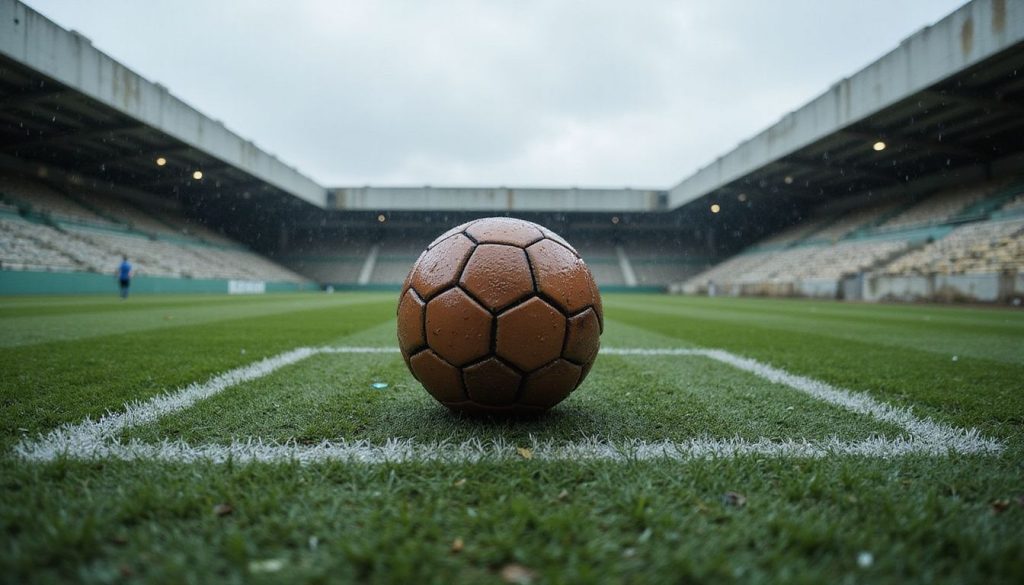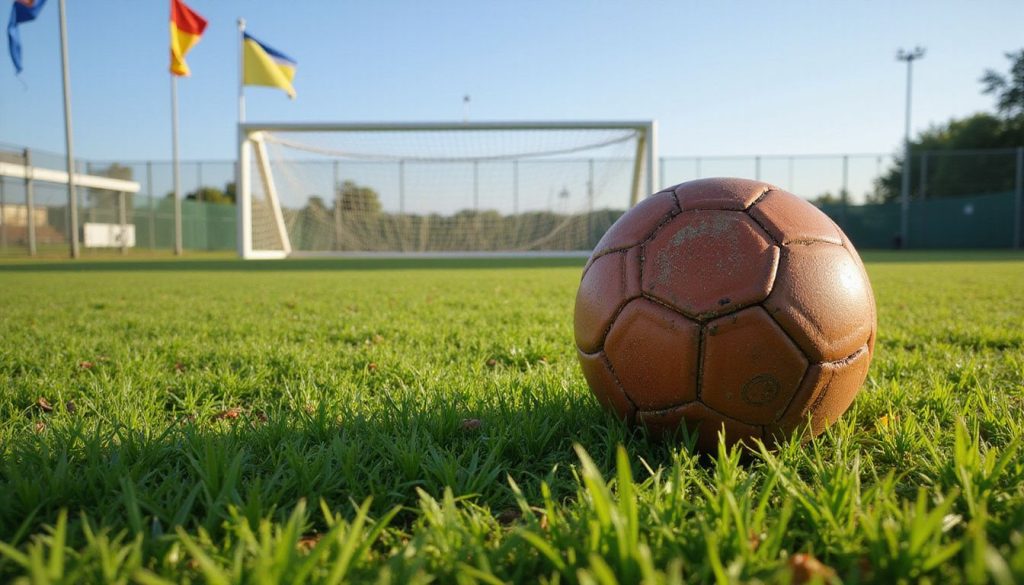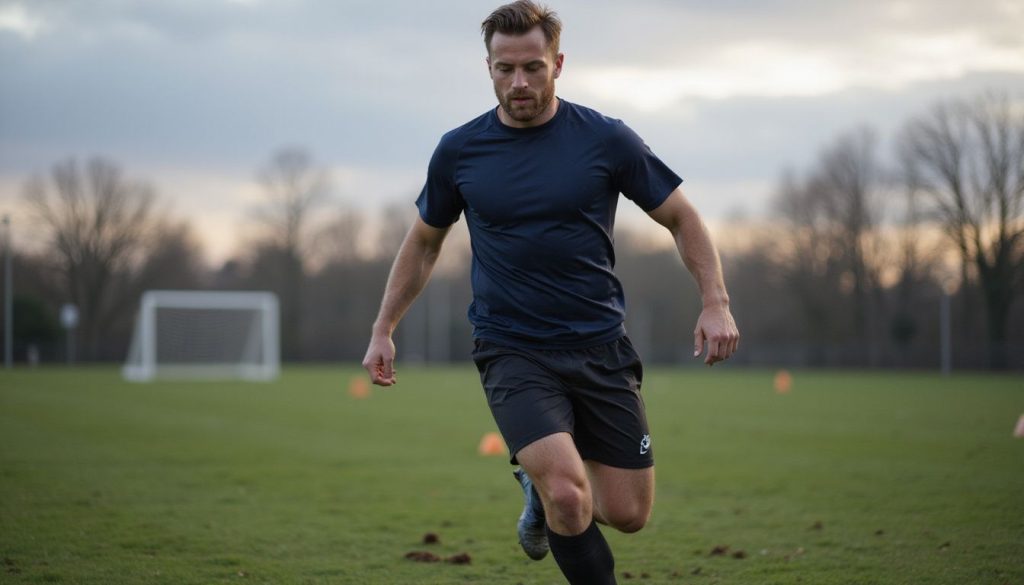Hydration Tips For Football Players
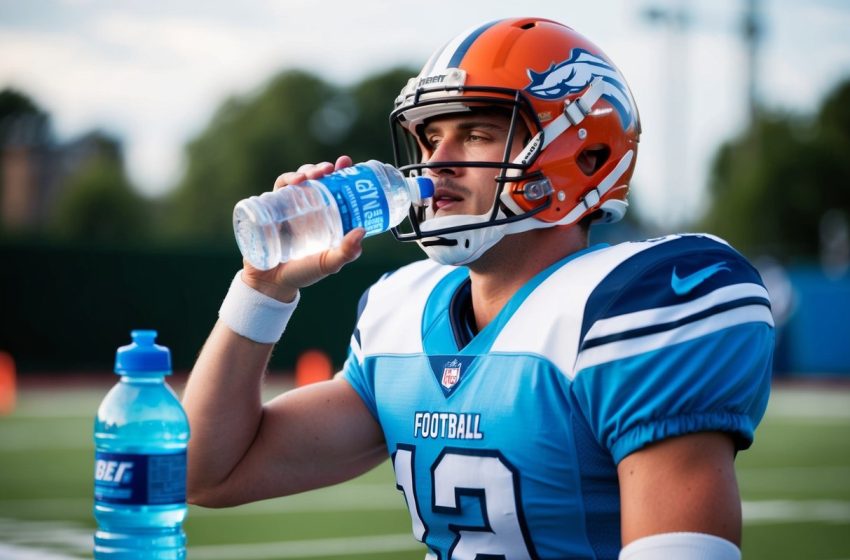
Hydration Tips for Football Players: Simple Ways to Stay Energized on the Field
Staying hydrated is one of the simplest but most important ways to help your body perform well on the football field. Drinking enough water and the right fluids replaces what you lose when you sweat, keeps your energy up, and helps you avoid cramps or feeling tired. Even a little dehydration can make you feel slower and hurt your game.
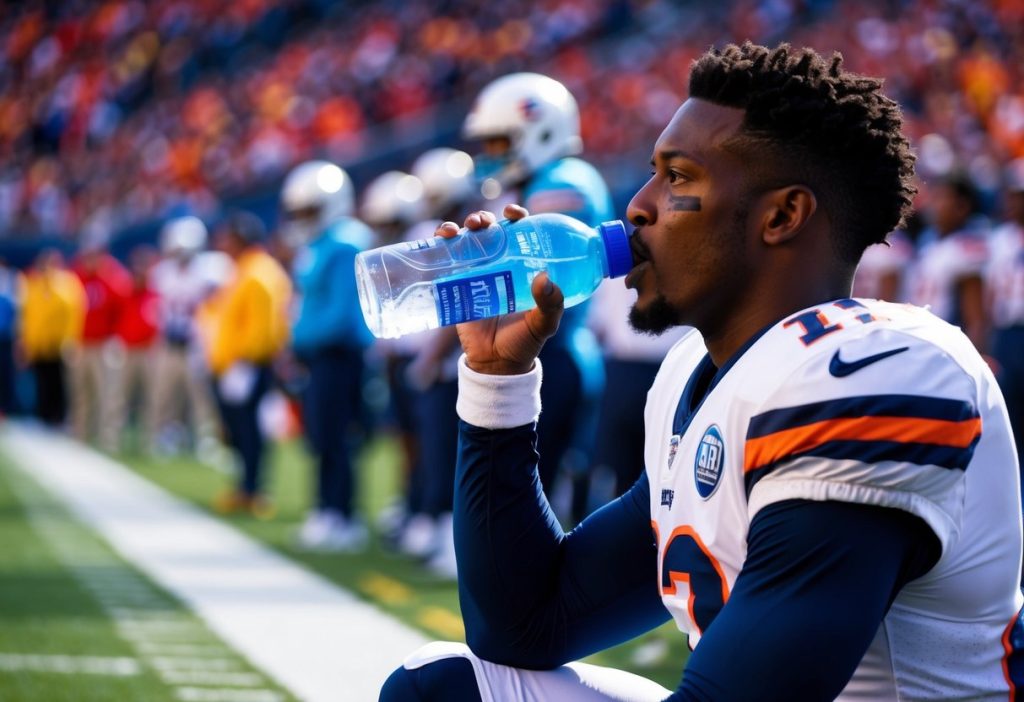
Football is a tough sport, and you can sweat a lot, especially during hard practices or games in hot weather. It’s not just about drinking water; sometimes you need fluids with electrolytes to help your body stay balanced.
Knowing when and how much to drink can make a big difference in how you feel and play. With the right hydration habits, you can stay sharp and play your best from the first whistle to the last.
Why Hydration Is Essential for Football Players
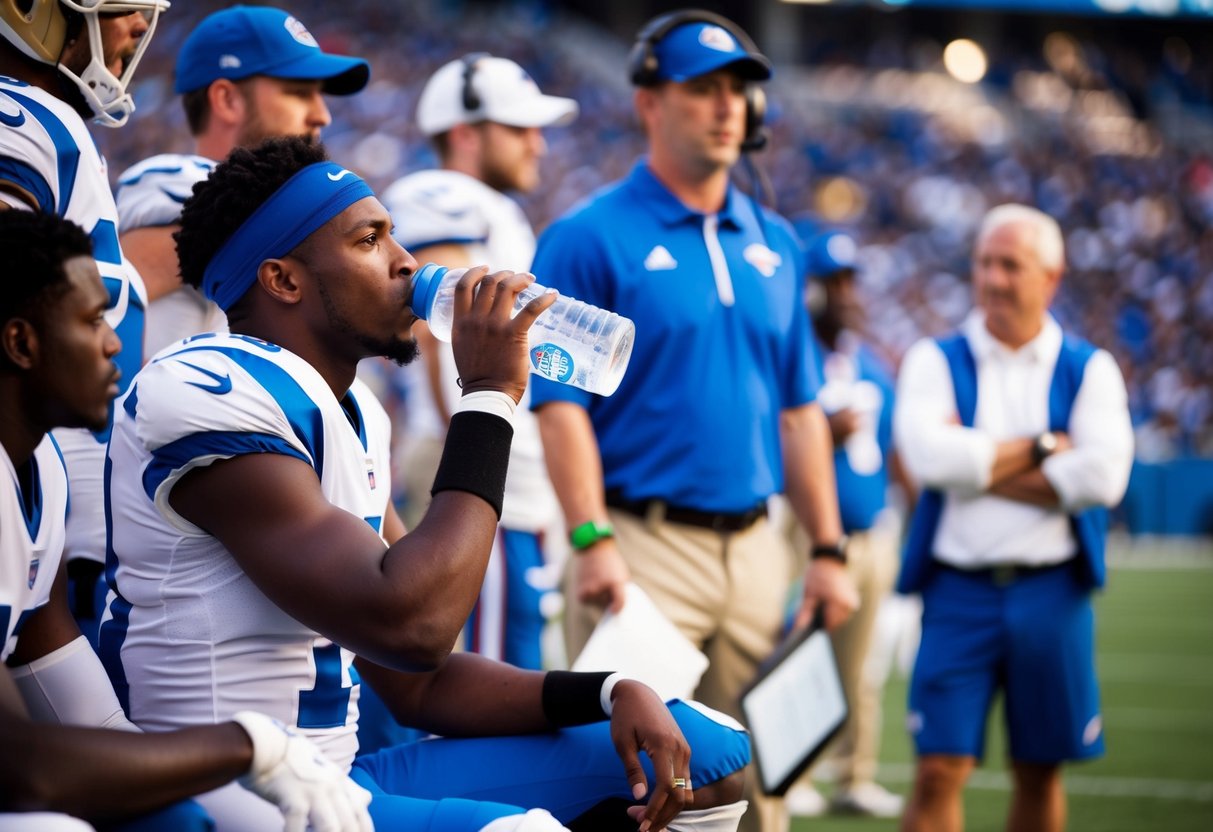
Staying hydrated directly affects how well you feel, move, and perform on the field. It also supports your health by reducing injury risk and helping your body recover after intense physical activity.
Impact of Hydration on Athletic Performance
Proper hydration keeps your energy levels up during games and practices. When you are well-hydrated, your muscles work better, and your reaction times improve. This can help you make quick plays and keep moving without slowing down.
Water helps control your body temperature, especially in hot weather. This reduces your risk of overheating while running and tackling. Good hydration also helps your heart and lungs supply oxygen to your muscles.
When you do not drink enough, you get tired faster and make more mistakes. You may feel dizzy or weak, which can hurt your focus and decision-making. Drinking enough water or a sports drink helps you play your best for longer.
Risks of Dehydration During Football
Dehydration can quickly become dangerous during football. Sweating causes you to lose both water and important salts from your body. If you do not replace these fluids, you may start experiencing muscle cramps.
You could also face headaches, confusion, or an upset stomach. Dehydration raises your risk of heat illness, such as heat exhaustion or even heat stroke. These are serious conditions that can keep you off the field and can require medical treatment.
A 2% drop in body weight from fluid loss can hurt your performance. Keep an eye out for signs like dark urine, dry mouth, or feeling very thirsty. These are good clues you need to drink more fluids.
The Importance of Maintaining Hydration Levels
You should start each practice or game already well-hydrated. It helps to drink fluids regularly throughout the day—not just during activity. Aim to drink about 16–24 ounces of water 10–15 minutes before you start playing.
While on the field, try to sip water or a sports drink when you have the chance. If possible, weigh yourself before and after activity to see how much fluid you lose. For every kilogram lost, try to drink 1.2–1.5 liters of fluid to replace it.
Here’s a simple hydration routine:
- Before: Drink water or a sports drink
- During: Take small, regular sips
- After: Rehydrate with water and consider a snack with salts
Staying ahead of thirst and not waiting until you feel dry is key to keeping your body and mind ready for the game.
Optimal Daily Fluid Intake Strategies
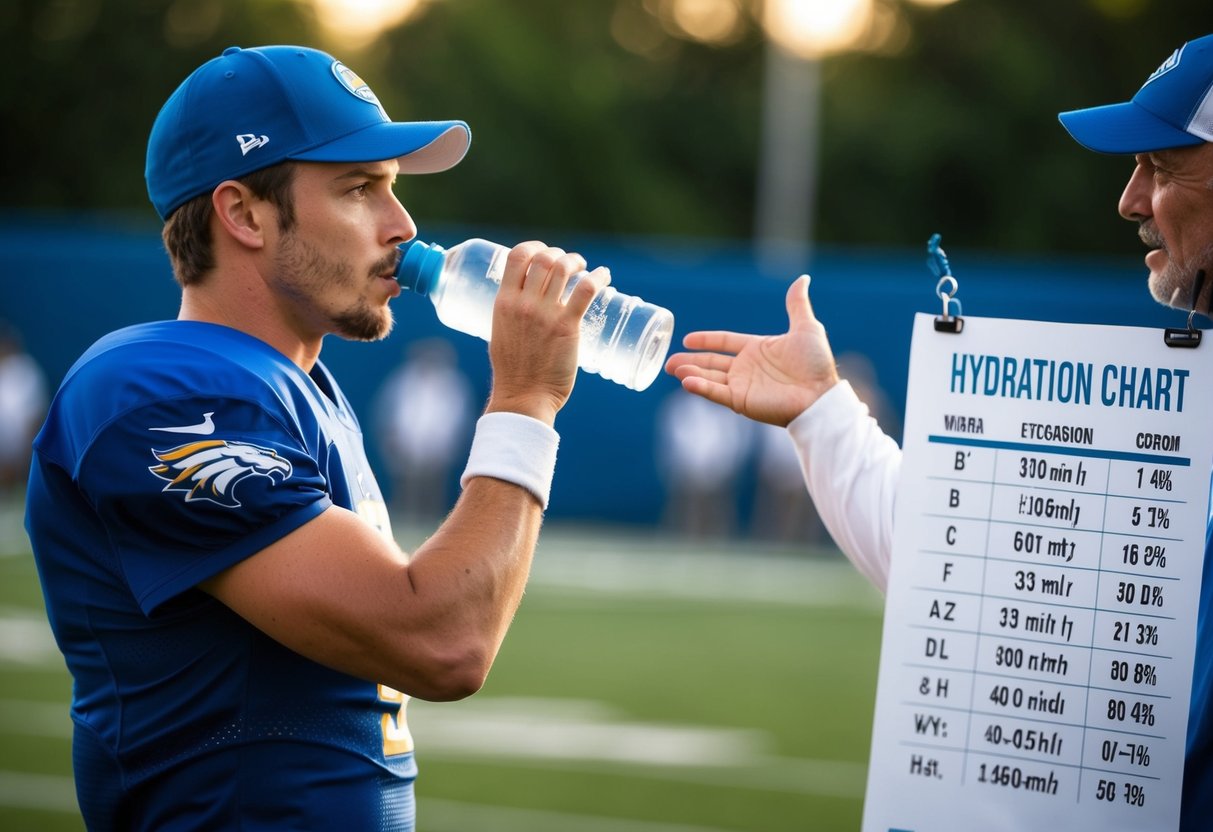
Staying hydrated each day helps maintain energy, focus, and physical performance on the football field. Drinking enough water and knowing your body’s hydration cues are important steps for all young athletes.
How Much Water Football Players Need
Your daily water needs depend on your age, size, activity level, and even the weather. In general, teenage football players should aim for about 2.5 to 3.5 liters of fluid each day.
That’s about 10 to 15 cups of water. Bigger athletes or those training in hot, humid conditions often need more.
Spread your water intake throughout the day. Drink water with meals and sip during breaks. Before practice or games, try drinking 16–20 ounces (about 2 cups) of water a couple of hours ahead of time. Afterwards, replace what you lost by drinking again.
If you sweat a lot or exercise for more than an hour, a sports drink with electrolytes can help replace sodium and potassium.
Monitoring Thirst and Hydration Cues
Your body gives signals that it’s time to drink. Thirst is one of the first signs you need water, but don’t wait until you feel very thirsty.
Check the color of your urine. Pale yellow means you are likely well hydrated. Dark yellow or amber urine could mean you need more fluids.
Pay attention if you start feeling tired, get headaches, or have muscle cramps during practice. These are all signs you might be getting dehydrated. If you are unsure, talk to your coach or athletic trainer about your fluid needs.
Make it a habit to drink water even when you’re not thirsty, especially before and after football activities.
Using a Water Bottle to Track Intake
Carrying a water bottle is a simple way to keep track of your fluid intake. Choose a bottle with clear measurement lines so you can see how much you’ve had.
Aim to refill your bottle several times throughout the day. For example, if you have a 20-ounce bottle, drinking four bottles gets you to about 2.5 liters.
Label your bottle or set reminders on your phone to help you remember to drink. Bring your bottle to school, practice, and games so water is always near.
Tip: Some athletes use bottles with built-in reminders or apps that track how much they’ve had to drink. This makes staying hydrated easier and more consistent.
Choosing the Right Fluids: Water, Sports Drinks, and More
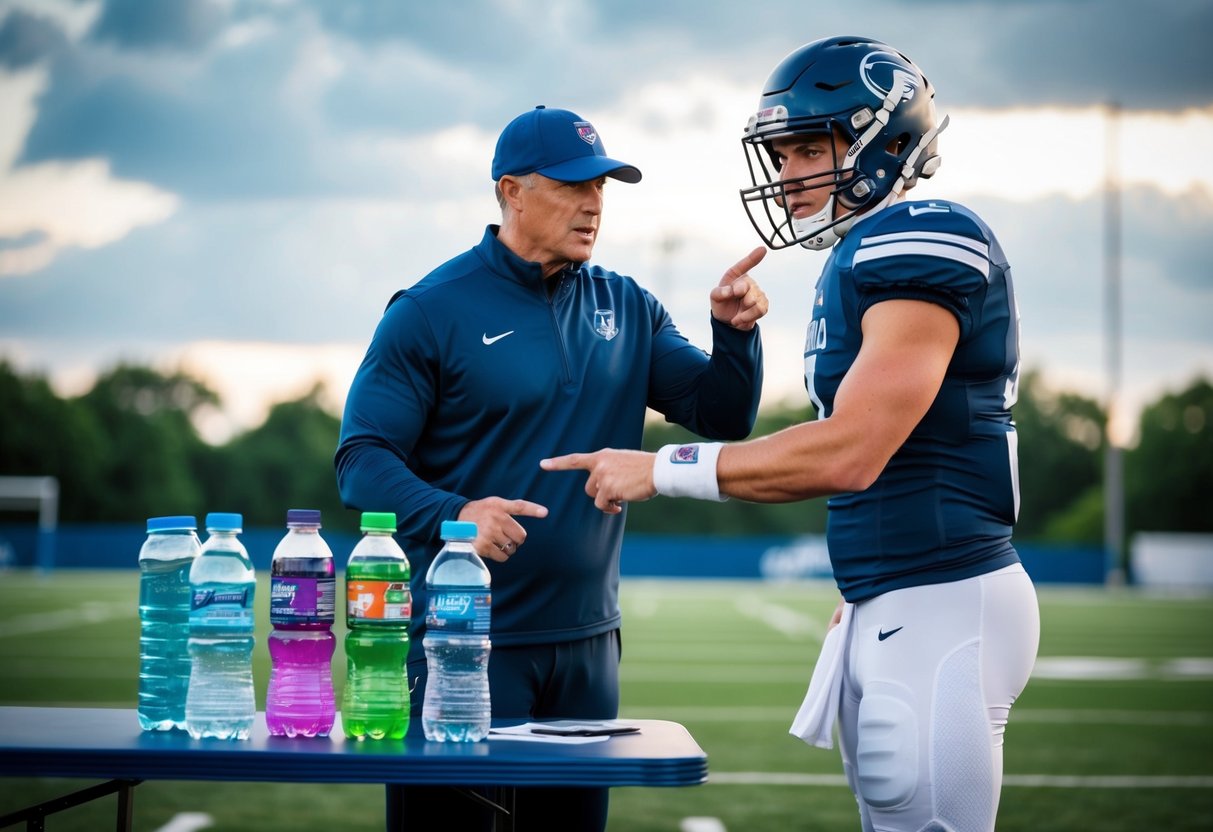
Staying hydrated is essential for your energy, performance, and safety on the football field. The type of drink you choose makes a difference, especially when you consider the nutrients, electrolytes, and carbohydrates that your body needs.
Benefits of Water Versus Sports Drinks
Water is usually the first choice for most players when it comes to hydration. It is easy to find, simple, and does not have extra calories or sugar. Water does a great job for short practices, light workouts, or when you are not sweating a lot.
If you are training for over an hour or playing on a hot, humid day, your body may lose a lot of electrolytes and carbohydrates through sweat. This is where sports drinks like Gatorade can help, as they contain sodium, potassium, and sugar to help replace these losses.
Quick Comparison Table:
| Drink | Best For | Contains Electrolytes | Adds Carbohydrates |
|---|---|---|---|
| Water | Short activity, daily hydration | No | No |
| Sports Drink | Long/intense play, heavy sweat | Yes | Yes |
Understanding Electrolytes and Their Role
Electrolytes are minerals that help balance fluids in your body and keep your muscles working well. The main electrolytes lost in sweat are sodium, potassium, calcium, and magnesium. Losing too many can cause muscle cramps, tiredness, and headaches.
Sports drinks are made to replace these key minerals during tough games and heavy training. Look for drinks that list sodium and potassium on the label. Sodium is most important, but potassium, calcium, and magnesium also help with muscle function.
If you notice muscle cramps or feel weak after practice, it may be a sign that you need more electrolytes, not just water. Adding a sports drink when you sweat a lot or play in hot weather can keep you feeling strong and focused.
When to Consider Beverages Like Milk
Milk is not just for after school; it can be useful for football players too. Chocolate milk especially gives you a mix of carbohydrates and protein, which helps your muscles recover after hard practice or a game.
Milk also has calcium and potassium, which are important electrolytes. This makes milk a good pick after exercise, but not usually during play, since it is thicker and may upset your stomach if you drink it while running around.
You can use milk as a recovery drink, especially if you do not have a sports drink handy. Just remember that milk is better after activity instead of during.
Selecting the Best Options for Training and Games
Choosing the right drink depends on the length and intensity of your activity. For a short practice or a light workout, water is all you need. Bring a water bottle and take small sips throughout.
For longer, harder practices or games, especially in hot weather, use a sports drink with electrolytes and carbohydrates like Gatorade. Look for drinks that taste good and are not too sweet, since you need to drink enough to stay hydrated.
If you want something extra after practice, chocolate milk is a good choice because it helps your muscles recover and replaces lost nutrients.
Bring both water and your favorite sports drink to games, and use each where it fits best.
Key Times to Hydrate: Before, During, and After Football

Hydration is a key part of your training program. When you drink fluids at the right times, you help your body stay strong and safe, from warm-ups to recovery after the game.
Pre-Game Hydration and Warm-Up Preparation
Start drinking water 24 to 48 hours before a match or hard workout. Don’t wait until just before kickoff. Try to drink about half an ounce of water for every pound you weigh per day leading up to your game. For example, if you weigh 150 pounds, that’s about 75 ounces each day.
On game day, it helps to drink 16 to 24 ounces of water two to three hours before your warm-up. This keeps your muscles ready for both endurance and power. Thirty minutes before you start, sip a few more ounces. Avoid drinks with lots of sugar or caffeine—they can draw water out of your body instead of helping you stay hydrated.
Hydration Techniques During Training and Matches
Stay on top of hydration while you play or practice. Don’t just wait until halftime. Sip small amounts of water during every break, even if you don’t feel thirsty.
If you’re training for longer than 45 minutes, a sports drink with some electrolytes and a little carbohydrate can help replace what you lose through sweat. This is especially important during hot days or fall sports where you sweat more. Keep a water bottle nearby. Listen to your body: if you notice dry mouth or feel tired, take a few sips right away.
Fluid Replacement and Recovery Post-Game
After your match or practice, focus on replacing any fluids you lost. Try to weigh yourself before and after playing. For every pound lost, drink 16 to 24 ounces of water to make up the difference.
Choose drinks that contain not only water, but also electrolytes and some protein if possible. This helps your muscles recover faster and supports your next workout or training session. Include snacks like fruit, yogurt, or a sports recovery drink to boost your hydration and help your body repair.
Supporting Hydration Through Nutrition
The foods you eat each day play a big role in keeping you hydrated and ready to play football. Eating a mix of fruits, vegetables, and foods with key minerals can help your body manage fluid balance and replace nutrients lost through sweat.
Role of Fruits and Vegetables in Fluid Balance
Many fruits and vegetables have a high water content, which helps with daily hydration. Eating foods like watermelon, cucumbers, oranges, and strawberries can give your body a boost of fluids.
These foods don’t just offer water—they also have important nutrients that help your body use and hold onto fluids. For example, bananas, potatoes, and spinach have potassium, which supports muscle and nerve function.
You should try to get a mix of colorful fruits and vegetables every day. A simple way is to include some fruit at breakfast or snack on cut-up veggies during the day. Doing this helps you stay hydrated and adds vitamins and fiber.
Electrolyte-Rich Foods for Athletes
When you sweat a lot, you lose electrolytes such as sodium, potassium, calcium, and magnesium. These minerals help with fluid balance and muscle function.
You can get these electrolytes through foods like dairy (for calcium), bananas (for potassium), nuts and seeds (for magnesium), and pickles or pretzels (for sodium). Some fruits, like oranges and cantaloupe, also have potassium and magnesium.
Carbohydrates are important too. They help your body absorb water and replace energy. Foods like whole grain bread, rice, and pasta give your body fuel for practice and games, while also helping with hydration when paired with fluids.
Frequently Asked Questions
Staying hydrated helps you avoid cramps, stay focused, and recover faster. Understanding how much and when to drink is just as important as knowing what to drink.
What are effective hydration strategies for soccer players during games?
Start drinking water before the game begins. Take small sips during breaks or at halftime. Try to drink fluids even if you don’t feel thirsty, because thirst can mean you are already a little dehydrated.
If you are playing for a long time or in hot weather, sports drinks may help replace salts lost in sweat.
How much water should a soccer player drink each day to maintain optimal performance?
Aim for about 8 to 10 cups (64–80 ounces) of water each day, but you might need more if you sweat a lot. You can check your hydration by looking at your urine color. Pale yellow means you are hydrated, while dark pee is a sign you need more fluids.
What do professional football players typically drink to ensure they stay hydrated?
Most pros drink water throughout the day and use sports drinks during practice or matches. Sports drinks help replace fluids and electrolytes like sodium and potassium that are lost through sweat.
What is the recommended amount of fluid intake before a football match?
Drink 10 to 16 ounces of water about 15 to 30 minutes before your match or practice. This helps make sure your body starts the game hydrated without making you feel too full.
What is the best way to rehydrate after intensive football training or a match?
After you finish playing, try to drink 2 to 3 cups of water every hour for the next 2 to 3 hours. This helps your body recover the fluids you lost from sweating.
What rehydration drinks are recommended for football players for recovery?
Water is usually best, but if you had a long or intense session, a sports drink with electrolytes can help your body recover faster. Milk or chocolate milk also offer protein and carbs that help muscles rebuild after tough training. Avoid drinks with caffeine or too much sugar, as they can slow down hydration.

